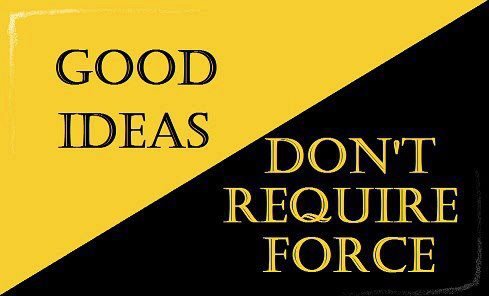A summary of a Voluntaryist position on natural rights

This is the third and final piece in my series on a Voluntaryist position of "natural rights". The first two articles can be found here:
- "On Natural Rights" is a discussion of the concept of "rights" as a moral abstract and a proof that individuals do in fact hold inalienable, natural rights that (though they may be violated by such) are not gifts from any government
- "Read me my rights" explores the concept that assertions of power are competing rights-claims and provides a razor for selecting the rights claim which is morally legitimate and concludes with the position that all individuals have two basic natural rights which extend from self-ownership and non-aggression
A cursory or inattentive reading of the previous two articles - especially if one should take them out of order or each apart from the other - might come off tautological or as an exercise in torching straw men. However, understood correctly and thoroughly read, what I actually present is a firm case for the basic principals of Voluntaryism which extend logically from the simplest nature of what a human being is.
Here I will present my total case in summary in which the only morally legitimate position - regardless of what cultural values are in place, as the moral legitimacy here is extended from the basic nature of a human being and are thus as close to "universal" as could be - is one which extends from the Voluntaryist principles of self-ownership and non-aggression (not pacifism). I welcome criticism on this conclusion, but please do not waste either of our time with questions answered already in the two linked articles above - you must either first either invalidate my basic premises, or you must show how my premises do not connect to my conclusion. Anything less is sophistry.
CONCLUSION
We first take as our basic building block the nature of a human being: a human being is a higher-thinking social primate who is able to take free-will action to shape his world and to form abstract constructs, such as morals. Criticisms on human stupidity and foolishness do not change the label of "higher-thinking"; this only addresses the degree, it does not alter the fact that the human mind is able to form, communicate and understand abstract concepts. Debates between evolution and creation are irrelevant; man is a social primate whether he was constructed by a god in that way or he evolved from lower great apes. Debates between neurological and spiritual explanations for "free will" are irrelevant; within the context of decision making from the point of view of the actor, these decisions are made by the will of the actor and changing the scope of the source of this "free will" does not alter its impact in human action.
As our first premise, then we have established human nature: a higher-thinking social primate with free will.
We then establish that human nature is not "might makes right" (which is important to note as it is the primary and most natural objection to "natural rights", and addressing it is not a straw man). Rather, the fact that our natures as higher-thinking social primates has enabled us to become the dominant species on the planet, to the point that establishing our biological presence off of our planet is a goal of some serious consideration. It is plain in even the most cursory examination of human history that systems of morality and cooperation are quintessential to that success; the life expectancy of a human could not be half what it is today without those things, were we truly subject to the "law of the jungle" rather than bending that law to our own moral principles. Again, in the words of Abraham Lincoln, "right makes might": our ability to form concepts of right and wrong and to thence engage in cooperative behavior are what makes us human, and the source of our global dominance.
As our second premise, we have therefore established that morality is in fact natural to human behavior, and stands as a pillar of our might in the struggle for survival.
We then establish the definition of a "right", that being a morally legitimate application of power. It is important that we do not, at this point, establish moral legitimacy of specific rights, evaluate competing rights-claims or take a position of whether rights are held by the individual or can be morally violated. We are only defining the term in a way which will encompass all possible "rights" that might be claimed: when one claims one has a right to do, say, use, possess or receive something, one is claiming that his claim to exercise the power to do so is morally legitimate. We also clarify at this point that "power" in this case is the ability to do a thing, and does not of a necessity mean the claim to authority over others, nor is it the exercise of control over others.
Our third premise is that a "right" is nothing more than a morally legitimate application of power, or the claim that such application is morally legitimate. This establishes as well the first aspect of our razor: in order for an application of power to be a "right", it must also be morally legitimate.
Next, we address the source and holder of rights; not to be taken as some unilateral conclusion of the debate between collectivism and individualism, we do however establish that rights extend from, are held and exercised by individuals. This does not solve the aforementioned debate; it is merely taken ipso facto that human beings are individuals collectivized by our natures as social animals, that action extends from individual decision and free will, that the collective is only reified by the existence of the individuals that comprise it. This is demonstrated in that even rights-claims to act on behalf of the collective (authority) are asserted and exercised by individuals within the collective.
Premise four is thus that all rights are held and exercised by individuals (even collective rights-claims) and thus that all rights are individual rights. This begins to build another aspect of our razor: the primacy of the individual in evaluating a rights-claim.
Establishing the fourth premise also establishes by implication the collective-of-individuals nature of morality. The same process for determining that the individual owns his rights applies to morality: although morality is a social (collective) construct, the collective does not have any will, thought or action of its own. Rather, said morality comes from the individuals within the collective. We can thus conclude that all "good" comes from and is defined by individual people, even the asserted "good of the many". As no free will actor can truly know the full will or good of another free will actor we can therefore establish that the most basic and universal morality which can be established is the primacy of the individual to action. Thus no rights-claim can assert the "good of the many" against the "good of the one" and be morally legitimate.
This completes the fourth premise (since rights are morally legitimate exercises of power) by establishing that "good" flows from the individual into the collective and that there can be no valid claim of good which violates the rights of the individual, completing this aspect of our razor: no claim to collective good can violate the rights of the individuals in the collective, that morality and rights are held by the individuals.
The fourth premise is thus that the individual, by his nature, within the collective holds rights which are morally legitimate powers which are his and that no competing rights-claim can exist which is morally legitimate.
These first four premises establish the first natural right of the individual: self-ownership. As described, self-ownership is nothing more than a logical extension of our natures as free-will actors, and the assertion that such is a right is nothing more than a logical extension of that combined with our natures as social animals capable of establishing moral abstracts.
The second right of the individual extends logically from and acts in concert with the first; if you own yourself and your actions, and no competing claim to that fact can be morally legitimate, you have the morally legitimate expectation that no action may be performed upon you in violation of your right to self-ownership, that no one may compel from you any action without your consent, nor harm your person or interfere with its actions insofar as your actions are outside the boundary of their own right to self-ownership. This is the principle of non-aggression: you have no right to violate the rights of others insofar as they are not violating your rights.
These are the only two morally legitimate natural rights, a positive and a negative right: you have the right to your self, and; you have the right to not be a victim of aggression.
These two principles taken in concert provide us a razor to evaluate any and all competing rights claims: the individual has the right to free will limited by non-aggression. This argument on natural rights of the individual can thus be summarized as:
- Human beings are higher-thinking social primates with free will
- Morality is a natural behavior of humans as social animals with abstract thought
- A "right" is a morally legitimate power
- All rights extend from, are asserted and exercised by individuals even if on behalf of a collective
- All morality, being an abstract created by individuals in order to collectivize, extends from the individual and thus cannot violate the individual
- Thus the individual, being a free will actor, has the highest possible morally legitimate claim over his actions (right of self-ownership/free will)
- Thus any action which violates that claim is not morally legitimate (right to non-aggression for non-aggression)
We can thus demonstrate, as a fact of human nature, that the basic principles of Voluntaryism (if not Voluntaryism itself) are the only morally legitimate natural rights and cannot be violated with moral legitimacy.

Thomas Shirk is a computer programmer, Voluntaryist and aspiring philosopher. Please come back to his blog or follow him on Facebook and Steemit for regular updates on Voluntaryism, capitalism and other philosophical insights